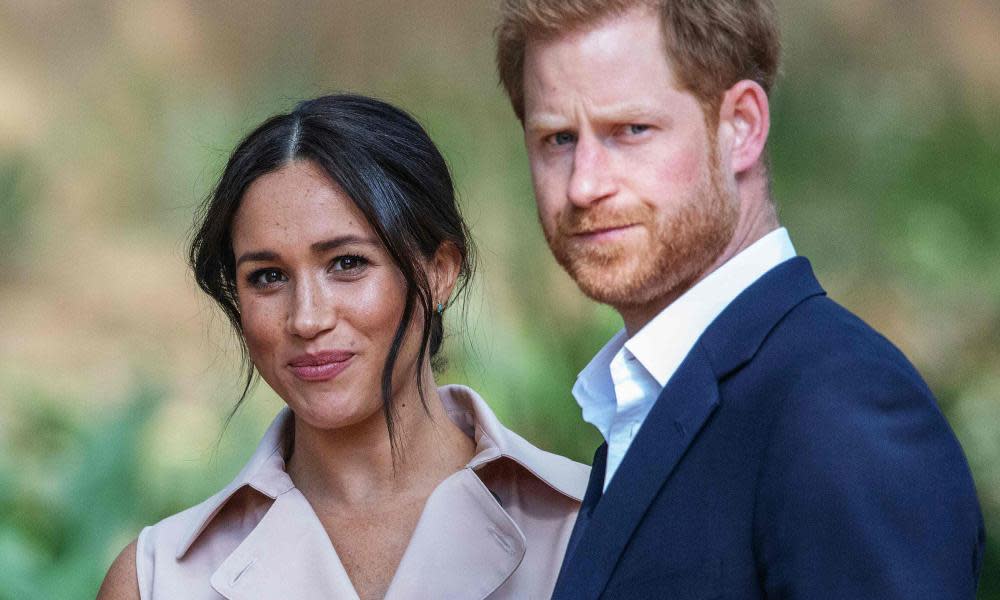Meghan just wants to be treated fairly by the press – and I don’t blame her

Once upon a time there was a beautiful little girl who grew up in a sunny place far, far away. This little girl grew up thinking that, with passion and hard work, she could change the world. Then, one day, she met a prince and fell in love and everyone thought she would live happily ever after. Especially her.
It was hard not to watch Sunday’s ITV interview with Meghan – or the Duchess of Sussex in our fairytale version – and not feel sympathy for a woman who has found herself alone with a new baby in an alien environment. After all, the year after having your first child is a challenge for most mothers: soreness, lack of sleep, the loss of self; the list goes on. Most of us keep it together by bingeing on crap TV while reminding ourselves – as we slap frozen cabbage leaves on our boobs – just how lucky we are. And we are, of course, so, so lucky. Then a friend or colleague stops and asks how we are – you know, how we really are – and we have a bit of a weep and apologise for being self-pitying and ridiculous and carry on.
It felt like that moment when Tom Bradby, the TV presenter and friend of the princes, asked Meghan how she was towards the end of a documentary about their royal tour of Africa and she welled up. “Thank you for asking. Not many people have asked if I’m OK, but it’s a very real thing to be going through behind the scenes.”
Some people will sneer and suggest that a wealthy woman should not complain, especially when she is on tour in a continent where, in some areas, there is such poverty. But do we want to live in a world in which pain is a competition and the royal family is just a TV drama, not a group of real people?
And for those who think her friends-with-the-Clooneys life must be perfect, she suggests few people can understand what it is really like “behind the scenes”.
Whatever the rights and wrongs of the monarchy (as far as I am concerned, they could all move abroad and just leave us the Queen), it does occasionally highlight truths about the world.
Most women who go through personal upheaval, family upset and childbirth are not followed by cameras and accused of jeopardising the future of the monarchy. Within hours of the interview airing, MailOnline had warned that Meghan was “damaging” the royal family. Some of the criticism of Meghan has been outright racist and sexist – smacking of distaste for the black woman who dares to email her highly paid staff out of hours.
Told by “British friends” that the tabloids would “destroy her life”, Meghan blamed herself for being “naive” and “American” and not believing them. “I know that I never thought that this would be easy, but I thought it would be fair.”
I have no sympathy for the view that a journalist should not be allowed to ask the royal family (or anyone else) whatever questions they like, as long as they are fair. But paying the person who walked her dog, pestering family members who didn’t bother coming to her wedding – is that fair?
The issue of fairness has become a legal one. The couple have launched an unprecedented legal challenge against the three biggest British newspaper groups – DMG Media, News Group and the Mirror group – and Sunday night’s interview suggests this row will not end soon.
Stretched across this cultural and social chasm, Meghan admitted that she “really tried to adopt this British sensibility of a stiff upper lip” but, deep down, she thinks that “what that does, internally, is probably really damaging”. She does not want to ignore the publication of a private letter. And, really, why should she?
In his own interview, it was clearer than ever that Harry will not let this lie. In fact, he would rather take on his own family than let it do so.
The relationship between the press and the royal family is often called a game, one that Harry’s mother, Diana, “knew how to play”. But it is not a game to him – he considers it the thing that killed his mother.
No one ever gets a fairytale ending, but the tone of this story really needs to change.
•Jane Martinson is a Guardian columnist

 Yahoo News
Yahoo News 
